
The quarterly magazine from CIVEA, the Civil Enforcement Association



The quarterly magazine from CIVEA, the Civil Enforcement Association

Amidst the evolving landscape of enforcement, Dukes proudly maintains its legacy as one of the few remaining family-run companies in the field. With a new generation at the helm, you can rely on our outstanding service with confidence, backed by over 30 years of proven excellence and two-time award-winning innovations Here at Dukes we ' re not just enforcement agents – we ' re family.
Experience the difference. Contact us:
Jonathan Savigar
Business Development Manager
07375 982 086
jsavigar@dukeslimited.co.uk



Policy in Practice’s latest report, ‘Missing Out 2024’ estimates a staggering £22.7bn of income-related benefits and social tariffs goes unclaimed each year. In this Q&A, we asked Karen, a ReachOut Pathfinder, how she encourages customers to claim the essential support available to them.
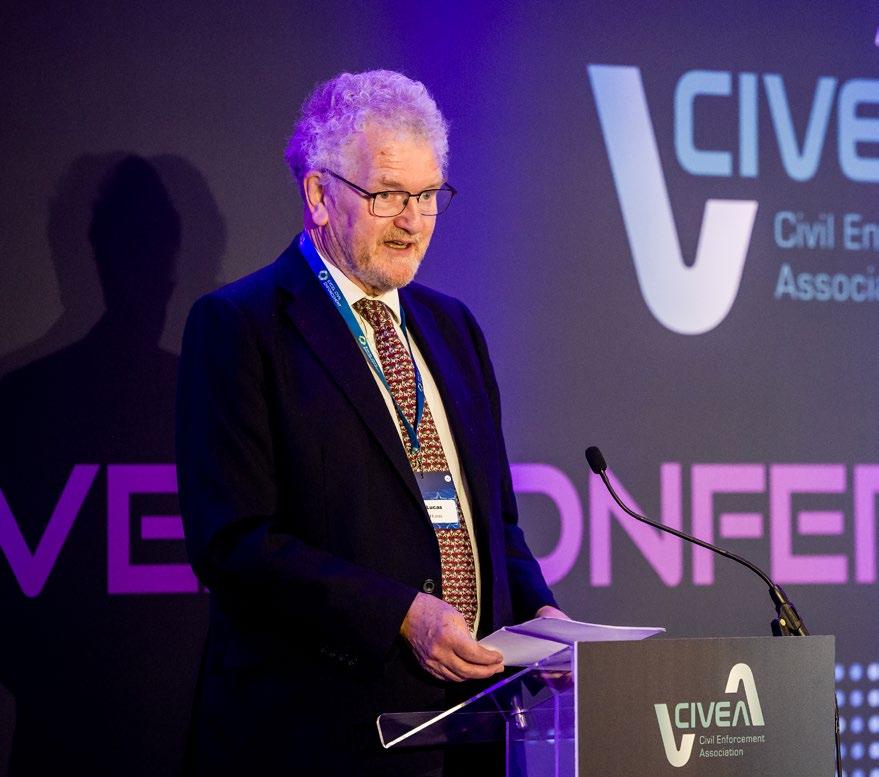

In recent years, the enforcement industry has undergone significant consolidation as larger companies have acquired smaller rivals, driven by an influx of outside investors attracted to the sector’s high margins and profits.

Last month, Chris Nichols from ECB took part in a panel at CIVEA’s annual conference – during the discussion, he outlined the ways in which the ECB is moving from principles to action.
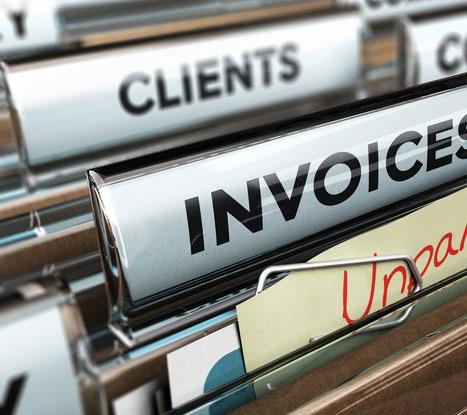
Penham Excel providing FREE service to local authorities (LAs) to remove illegal vehicles from their communities. As they explored the growing problem of Persistent Evaders of Penalty Charge Notices (PCNs), they liaised with the Police, DVLA and Government in order to tackle this issue, and discovered most evaders of PCNs had no vehicle tax.
President: Sarah Naylor
Vice President:
Amy Collins
Treasurer: Simon Jacobs
Imm e diate Past
President: Paul Whyte
Adrian Bates
Amy Collins
Dave Burton
Jason Carter
Terry Durant
Mike Garland
Deborah Hudson
Carole Kenney
Michael Line
Andrew Mackay
John Mason
Anthony Quinn
Andy Rose
Martin Stanford WSA
1D South House, Bond Avenue, Bletchley,
Keynes MK1 1SW Tel: 01908 371177
ADVERTISING / EDITORIAL
Email: enfnews@ wsacommunications.co.uk
Call: 01908 371177
I hope you all found the CIVEA conference of interest and not without, perhaps, some enjoyment.
This will be my last public comment as President, having served as President for two years now I hand the reigns over to Sarah Naylor.
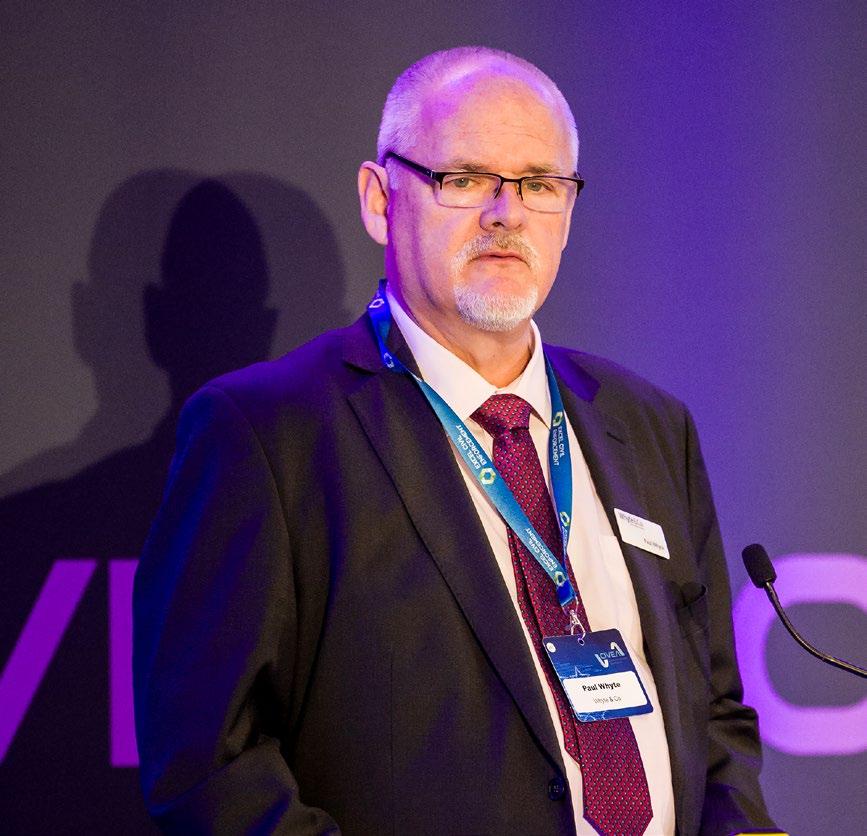
As I reflect over this period, I have been privileged to represent our industry during interesting times.
One of my first duties in the role was to give witness evidence to the House of Commons levelling up committee back in June 2022. Attending a Parliamentary chamber to be filmed and questioned by a number of MPs - this was terrifying, tense, interesting and even enjoyable all in one, if such a state of mind can exist.

Attending meetings with the Ministry of Justice as we worked through the upcoming changes and seeing the Enforcement Conduct Board develop into the independent insight we have all hoped for – it has all been a rewarding and enjoyable experience.
However, it’s not all been plain sailing. Throughout the last two years the industry has continued to suffer the slings and arrows of a negative advice sector, with anecdotal evidence that just fails to conflict the facts. I would ask that the Enforcement Conduct Board (ECB) be given space to do its job. It is from the ECB that everyone working in this industry can soon receive insight based on the evidence.
The enforcement sector is open to this and will support any ECB findings, whatever they may be.
As I look to step down as President, I would take a moment to thank Russell, our CEO, for the work he does for CIVEA. His support for the association is steadfast and I have personally found his help behind the presidency second to none.

I have found his support invaluable, as I’m sure Sarah will over the coming months.
My thanks also to the CIVEA executive, a team of dedicated professionals who gather quarterly in the best interests of our industry, thank you also for your support over the last few years.
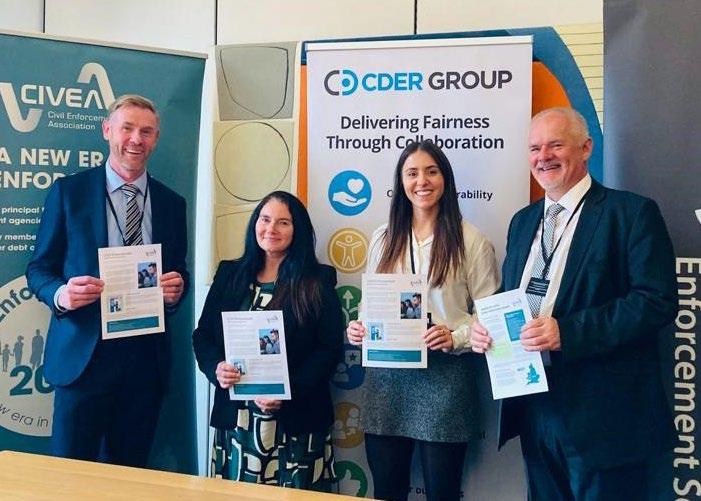
“We need a system of simple and straightforward debt solutions, and we must ensure that people, including those on negative incomes, are always able to access the solution that best suits their needs. One part of the solution has to be to reduce creditors’ reliance on bailiffs, whose fees, which rose substantially last year in the middle of a cost-of-living crisis, are simply added to people’s debts, making them less and less affordable. Bailiffs are often part of the problem, not the solution. We have to encourage creditors—including public sector organisations, the Government and local authorities—to embrace a fairer and more effective system that prioritises affordable payment plans over the seizure of goods.” Yvonne Fovargue, Labour Makerfield.
For more news go to the CIVEA
Navendu Mishra Labour, Stockport: To ask the Secretary of State for Levelling Up, Housing and Communities, pursuant to the Answer of 14 December 2023 to Question 6351 on Local Government: Debt Collection, whether his department monitors adherence by local authorities to the guidance it publishes.
Simon Hoare Chair, Northern Ireland Affairs Committee, Parliamentary Under Secretary of State (Department for Levelling Up, Housing and Communities):
“As has been the case under successive administrations, the collection of council tax is a responsibility of local authorities.”
Navendu Mishra Labour, Stockport: To ask the Secretary of State for Levelling Up, Housing and Communities, which local authorities have the highest rates of (a) non-payment and (b) payment of council tax.
Simon Hoare Chair, Northern Ireland Affairs Committee, Parliamentary Under Secretary of State (Department for Levelling Up, Housing and Communities):
“The Government annually publishes data on the collection rates of council tax, setting out the percentage of expected council tax income each billing authority collected in year.”
Navendu Mishra Labour, Stockport: To ask the Secretary of State for Levelling Up, Housing and Communities, what estimate he has made of the total amount of revenue raised by local authorities via the use of debt recovery agencies in the last 12 months.
Simon Hoare Chair, Northern Ireland Affairs Committee, Parliamentary Under Secretary of State (Department for Levelling Up, Housing and Communities):
“The Government does not collect data on the different collection methods used by councils, or the revenues collected by them. The Government does however publish data on the overall amounts of council tax and business rates collected and the total arrears for each financial year.”
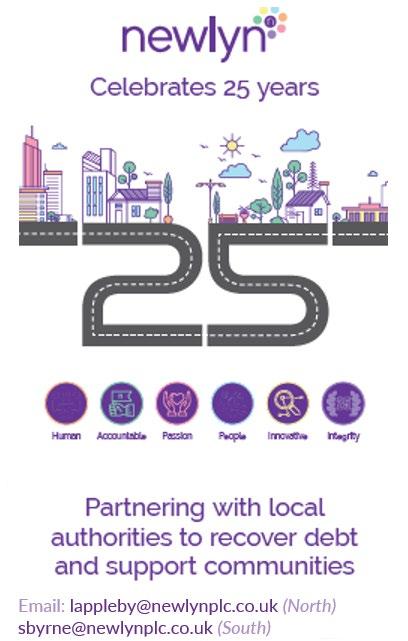

As I step into this role, I’m deeply mindful of the exceptional leadership demonstrated by my predecessors and the remarkable strides they made during their tenure. Their dedication has set a high standard, one that I am wholeheartedly committed to upholding. I look forward to continuing to collaborate closely with Russell Hamblin-Boone (CEO), Frances Richardson (Complaints and Compliance Manager), Simon Jacobs (Treasurer) and our new Vice President, Amy Collins, as we navigate the path ahead.
I extend my heartfelt gratitude to all who have entrusted me with the responsibility of leading our trade association. This is a responsibility I take seriously, recognising that our journey to redefine and shape modern enforcement demands our collective focus and effort.
As we embark on this journey together, I feel compelled to highlight several key areas that will guide my endeavours:
Firstly, the establishment of new standards and the oversight provided by the Enforcement Conduct Board (ECB) mark significant and exciting milestones in our industry’s evolution. While we’ve made significant progress over the past decade, propelled by the Taking Control of Goods Regulations and technological advancements, I believe the next phase of our evolution demands more. It requires collaboration with the ECB, continued investment in technological, social, and environmental matters, which I’m hopeful will remain possible with the uplift in enforcement fees for members.
In an era where media scrutiny is omnipresent and instantaneous, I encourage the industry to adopt a more vocal celebration of our achievements, not because we need to respond to every claim, allegation or statistic, or even because we lack professionalism. Rather, because our modesty often downplays the transformative impact we’ve had within the enforcement arena. Doing this, alongside the shared insights from the Enforcement Conduct Board, gives me greater confidence in our ability to navigate media inquiries adeptly, ensuring our industry is accurately represented and its reputation protected.
Beyond accolades and awards, I firmly believe there is a role to publicly elevate the status of the workforce (enforcement agents and back-office staff) recognising their indispensable role in our society’s financial and legal fabric, while prioritising their well-being and professional growth. It is a tough industry to work in, but it is also deeply fulfilling, offering the opportunity to make a meaningful difference in our communities, so it would be great to encourage more future leaders into the field. Encouraging and nurturing talent not only ensures the continuity of our profession but also inspires innovation and excellence.
Additionally, alongside my role as President, I am deeply committed to supporting diversity and inclusivity within our ranks. This includes actively encouraging more women to join our industry and endorsing initiatives like the Women in Revenues Enforcement group (WIRE). Recognising the immense value of diverse perspectives, we will strive to create a more inclusive and dynamic workforce, challenging stereotypes and reshaping perceptions about enforcement professionals.
I look forward to embarking on this journey alongside you all, and I thank you in advance for your ongoing cooperation and collaboration.
 Sarah Naylor President CIVEA
Sarah Naylor President CIVEA








t: 01792 645544
e: enquiries@ajenforce.co.uk
w: www.ajenforce.co.uk
Rundles is a leading provider of ethical enforcement services that works with you to design and deliver a fairer approach to debt resolution.
Our advantage builds on a long-established reputation for great service, fair resolutions and a one team approach. With us it’s simple, we provide excellent recoveryrates, and the best customer service in the industry; delivered by dedicated experts, trained and qualifi ed to the highest standards. With our commitment to fairness and recognising vulnerability early, our professionals act as part of your team, working to respond to your precise needs and achieving maximum recoveries together.


Policy in Practice’s latest report, ‘Missing Out 2024’ estimates a staggering £22.7bn of income-related benefits and social tariffs goes unclaimed each year.
£5bn of that figure is unclaimed support available through local authorities.
A lack of awareness, the complex criteria around eligibility and the stigma associated with benefits are just some of the reasons why this mountainous figure persists year on year.
In this Q&A, we asked Karen, a ReachOut Pathfinder, how she encourages customers to claim the essential support available to them. She shares her own personal experience of accessing welfare support during a turbulent time in her life and how this helps fuel her conversations with customers today.

Can you tell us how you’re encouraging customers to maximise their income? What have those conversations been like? It’s an absolute mix! We do get some people who are more familiar with the benefits system. They’ve claimed in the past and it made a difference.
But then we speak with people who have never claimed benefits before. They’ve fallen on difficult times, and it’s a massive shock to be in the position where they need that support. We talk about welfare support as a safety net, something to help them get back on their feet; not something to be ashamed of.
There’s frustration as well, especially where customers have applied in the past but have been turned down and don’t know why. When their circumstances change, often they just assume they won’t be eligible, and there’s a reluctance to go through the whole process again, with no certainty of a better outcome.
“ We talk about welfare support as a safety net, something to help them get back on their feet; not something to be ashamed of.”
What about the stigma attached to welfare support?
I understand why people attach a stigma to benefits. People want to provide for their families, they want to be self-sufficient, and so asking for help or claiming support makes them feel like they’ve failed. We spend a lot of time talking them around from this position, we help them realise the material difference that money could make to their everyday life. For some people that’s just putting food on the table three times a day.
What has your own experience of accessing benefits been like?
I’ve claimed in the past and my own experiences are a massive help in my conversations today. I know what it’s like, I’ve been through more or less the same circumstances that our customers are going through.
When I split from my husband, I was left with the two children and had to claim Income Support. I felt degraded to be honest, because I’d always worked ever since I was 16. Claiming that kind of support isn’t just an easy item on the ‘to-do list’. There are a lot of emotions at play, and people are having to claim because of difficult personal circumstances. I’d lost two of my four children and my marriage had come to an end. I had to start from scratch and the process of claiming support wasn’t easy.
What’s the approach that you and the team at ReachOut take?
Our approach is different. Though we’re calling because there’s a debt, we’re not there to collect money. We can focus the conversation on how we can help the customer get every penny they can coming into the home, because often that’s the only way things are going to realistically improve. Just a few extra pounds a month can make a massive difference when you’re struggling. If they are eligible for benefits, it can be hundreds or even thousands extra coming in! That’s an exciting prospect for people when they’re struggling, and we can help get them to the right place to get the process started.
What would you do to increase the uptake of support?
Communication is key, how we communicate the help available in a way that encourages people to apply. If the offer of help comes alongside an outstanding debt balance, customers will see the debt, and that’s all they’ll see. The part of the letter explaining that they could be entitled to support doesn’t land, it doesn’t take root or spur them into the right kind of action. Support can’t be an afterthought; we’ve got to lead with that message.
What would you like to see more organisations doing?
There are people out there who just cannot complete the forms unassisted. I’d love to see more provision for people who need that kind of help, especially with most things moving towards digital by default.
It would be great to see organisations being more proactive as well. There’s some great data analytics out there making it possible to spot those more in need. But it’s tough, especially for councils because their resource is low.
If you owe money to the council, but the council are also the people that administer some of the help you need, there’s always going to be some residents too afraid to speak with them. They’re afraid they’ll be asked for money they don’t have, even though the whole conversation should be about bringing more money into the home, or to help clear the debt they do have in a sustainable way.
We’re working with councils to bridge that gap. We know that councils can provide loads of support aside from council tax reduction, so it’s exciting to get those conversations going and to get people into a better place.
Jonathan.shaw@sigmaconnected.com https://www.linkedin.com/in/jonathan-shaw-2872a2170/

In April the Civil Enforcement Association returned to the De Vere Grand Connaught Rooms in London for a one-day conference, exhibition and gala dinner
The theme of the conference was Defining Modern Enforcement, which signalled the need for debate on how the industry defines itself in the wake of the pandemic and what is required to meet the challenges of our public sector.
The theme this year is Defining Modern Enforcement. It has been ten years since The Taking Control of Goods Regulations came into force. So, the conference was an opportunity to review the impact of the regulations and ask ourselves what a future enforcement sector will look like.
The conference brought together the enforcement industry, local government, the technology sector, civil service and debt charities to debate issues and share ideas on how, with increased demand for the highest standards, the industry can continue to support central and local government clients. Topical debates ranged from operational challenges like responsible collections and smart enforcement to policy challenges, including independent oversight and sustaining a high-calibre workforce.
The day began with a message from Lord Bellamy, the Justice Minister, who thanked the industry delegates for their important contributions. He spoke of his desire for fair treatment of people and debt and his support for the innovative use of technology. He was grateful for the industry’s proactivity in supporting the Enforcement Conduct Board (ECB).
The keynote speech was delivered by Lord Lucas, Chair of the Enforcement Law Review Group, who confessed to being a convert to the industry having previously been critical. He spoke of the reform programme that has led to collaboration on an independent oversight body and its importance for the evolution of our sector.
The morning panel sessions focused on the use of technology. The first session highlighted the development of technology solutions that has become integral to modern enforcement.


After lunch the focus turned to industry supervision and the challenges of professionalising our industry. Our new President led a panel that considered best practice from other sectors.

The final session was an in-depth discussion on the challenges for the enforcement industry that is seeking recognition as a skilled profession. Topics included diversity in the workforce and staff welfare and training.
The second panel discussed how data is being used in modern enforcement and predict how it will support enforcement action in the future.
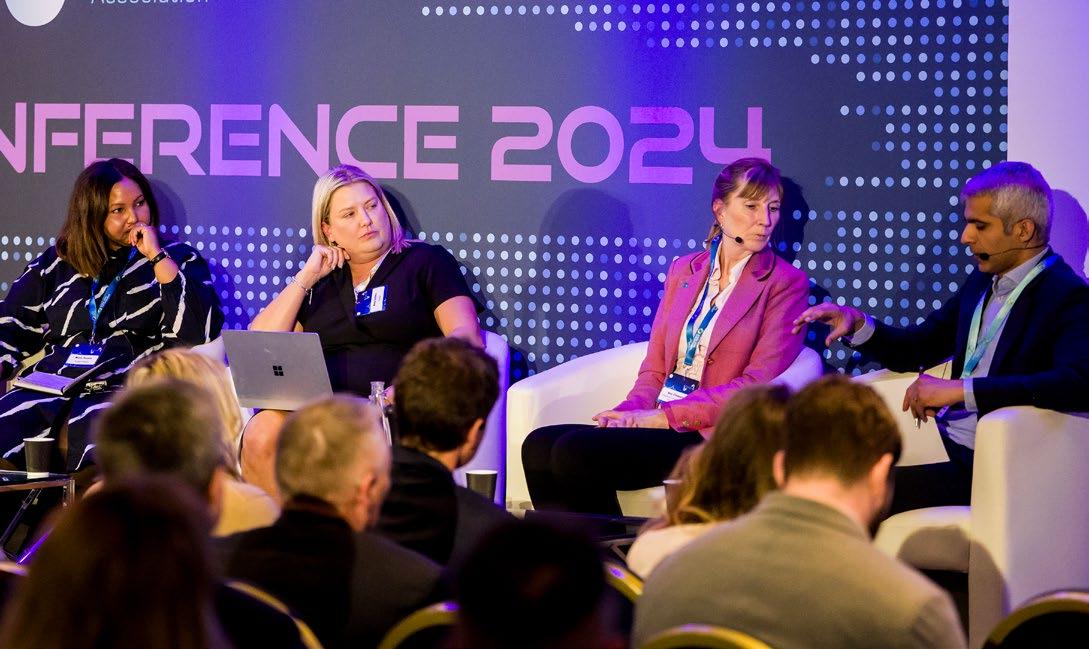
Beyond the ECB: Professionalising our sector
Panel 1 The impact of technology on collections and vulnerability Panel 2 Data is the key to unlock Smart Enforcement Panel 3 Preparing for independent supervision Panel 4


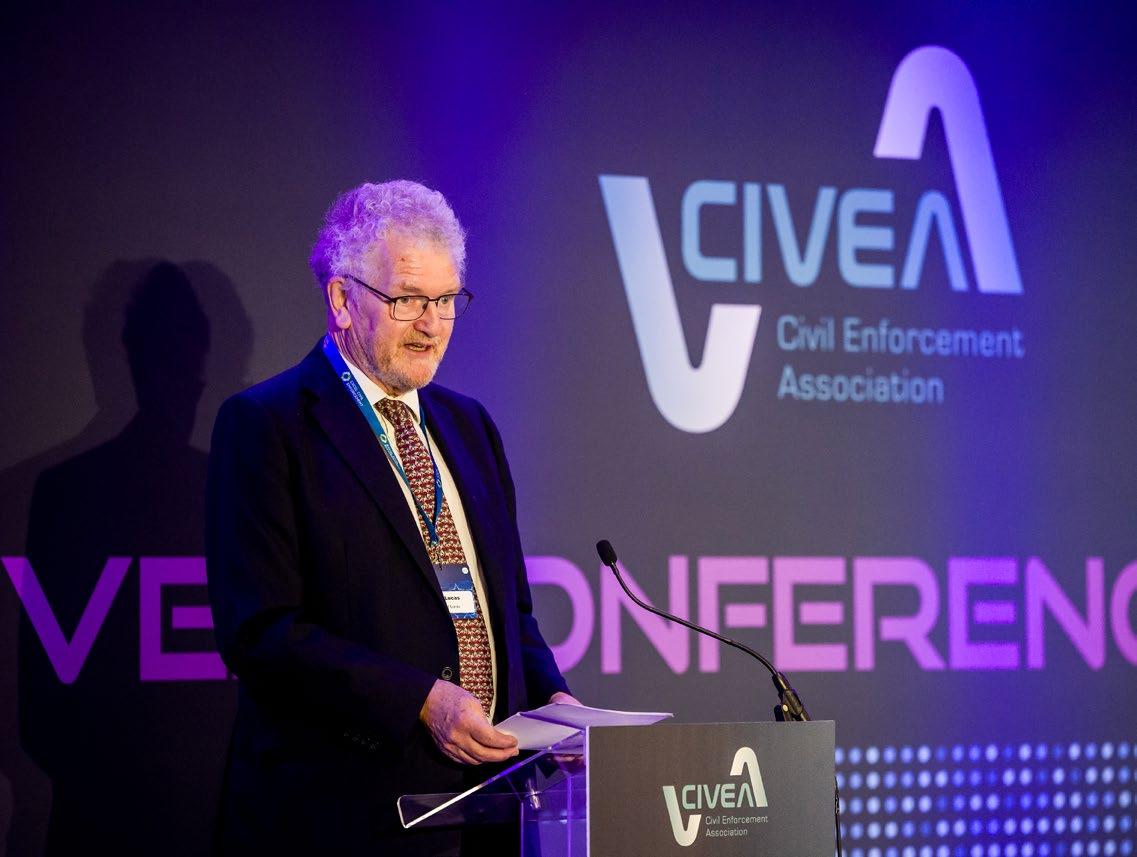





CIVEA hosted the second ever Enforcement Industry Excellence Awards at a gala dinner in London’s West End.
The CIVEA industry awards showcases the best practices in the enforcement sector and spotlight exceptional performance. The judges were keen to reward forward thinking, market-leading vision, or superior service standards that you bring to enhance the civil enforcement profession.
As an industry we operate discreetly under the radar. The Excellence Awards are an opportunity to embrace excellence and professionalism in the industry and celebrate success.
The glittering event was hosted by Zoe Lyons, an award-winning comedian and regular guest and presenter on TV and radio.
Well done to all of the finalists and congratulations to the winners!
Peter Wallwork – Non-Executive Director, Trustfolio
Robert Thompson – Chairman, Civil Court Users Association
Dave Pickering – Compliance, Adjudication and Review of Enforcement Panel
Claire Aynsley – Head of Membership and Compliance, Credit Services Association
Paul Bowden – Partner, Wilkin Chapman LLP
Kevin Shaw – Senior Creditor Strategy Manager,



Recognising exceptional individual performance in the field
The judges were looking to award an enforcement agent who merits specific recognition.
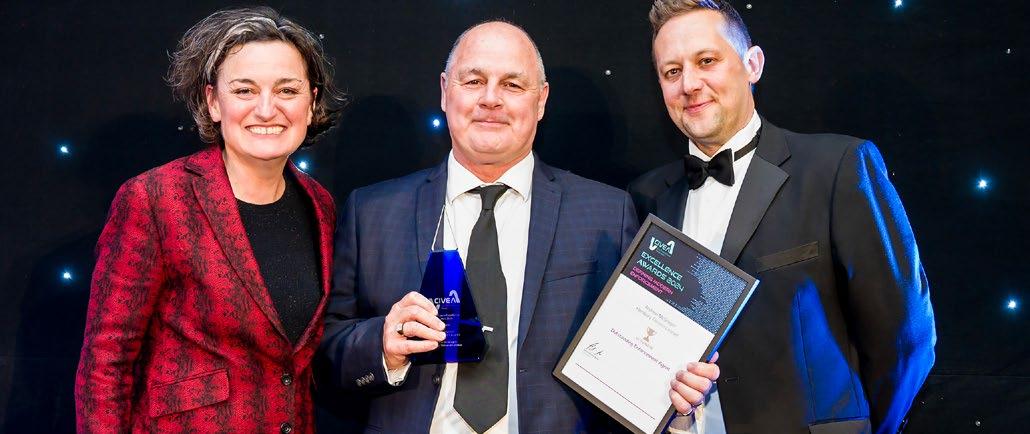
Andrew McGregor, Hambury Tilmond Limited
New to the awards programme, this was an open category for women working in the industry or related private or public sectors, who have made a significant contribution to enhance the role of women in the civil enforcement sector. This may be a contribution over a period of time or a recent new initiative.
The judges were looking to award an individual who merits specific recognition. There were five high calibre finalists.

WINNER:
Carole Kenney, CDER Group
Local authority partnership –
Celebrating a community partnership with a local authority
The judges were seeking an example of a partnership with a local authority that leads to outstanding service and results, particularly using technology.

WINNER: Rundles
The judges were looking to reward innovation that drives up industry standards, particularly where this involves the use of technology.

WINNER: (larger business)
Dukes Bailiffs (Chat Bot)

WINNER: (small business)
JTR Collections Limited (with Acquired Limited)
Best vulnerable support initiative –
Acknowledging excellence in sustained welfare support for an individual or individuals
The judges rewarded an initiative that demonstrates a strong understanding of vulnerability and is an exceptional response to support an individual or individuals.

WINNER: (larger business)
Equita Limited

WINNER: (small business)
Hambury Tilmond Limited
Demonstrating a successful and transformative training initiative
The judges awarded examples of training and development that have enhanced the performance of an organisation and promotes best practice.

WINNER: CDER Group





Through experience and research, we know that vulnerable customers often struggle to engage. They may find direct communication daunting and difficult.
People with problem debts are 50% more likely to suffer from poor mental health (MIND). Of these:
• 80% are afraid to open the post
• 73% will not answer unknown numbers
• 60% are afraid to answer the front door.
We wanted to remove as many barriers to engagement as possible, and place agency in the hands of those vulnerable customers who may be afraid to reach out or are trapped in a cycle of debt.
The first step – making contact – is often the hardest Through a blend of human approach, technology and data analytics, we have developed a unique, transformational Customer-Managed Vulnerability Engagement Tool.
Our Vulnerability Self-Declaration service is a simple web-form, available 24/7 without the need to pick up a phone and speak to someone. Vulnerable customers can engage with us on their own terms; from the comfort of their own home; and at their own pace.
Using the web-form, people can describe their circumstances in their own words; upload supporting documents; reach out to us in an accessible way, in their mother tongue, or use the many adjustments available.
We use 13 vulnerability codes and these can be communicated discreetly. We know those experiencing coercion or abuse may have limited opportunities to reach service providers. The selfdeclaration draws on technology to bypass traditional barriers to engagement and ensures optimal accessibility.
Uniquely our customers can request a time-slot for a Welfare Call-Back.
The results are compelling:
• 60% of customers using the form had never engaged with
us previously
• 25% of customers set up a payment arrangement on their appointment-based welfare call
• 88% of our arrangements complete
• On average 188 customers engage with the form per month
• 41% of contacts with our website lead to forms being completed
• 82% of people who do talk to us about their debt say that “they felt better about their situation” .
We integrate our own data analytics with the tool. If a customer has a low propensity to pay, we run an SMS campaign with a link to the form. The form enables self-reporting, and thus provides key insights. Once a customer has completed the form, there are a host of provisions we can offer, centred on a tailored, customercentric approach to vulnerability.
This may include individualised welfare and support services relevant and local to the individual; invitations to our debt clinics, which is an opportunity to have a Financial Health Check and receive budgeting advice in confidential surroundings; and signposting to key service provisions.
The Vulnerability Self-Declaration web-form is a link in a wider chain of options for the vulnerable and people with a low propensity to pay. They include self-serve Benefits Eligibility Calculator and self-service payment arrangements. Both tools are based on the same premise of placing control in the hands of the customer, offering digital, self-service ways to engage.
While the process is customer-led, this interplays with our enhanced data analytics, including scoring based on multiple data points and dynamic data capture throughout the debt lifecycle. We take a preventative approach recognising that often people are one bill away from being financially very vulnerable.
As a result, we want to tackle debt before it comes into a negative spiral. With our interventions, we minimise fees, identify cases suitable for our Hardship Fund, and extend the compliance windows or pre-compliance stages.

To continuously increase collection and improve customer service in the modern world JTR Collections has shaped our strategy to put us ahead of our competition streamlining both letter and payment facilities with amazing results.
Originally letters, prescribed by regulations, dictated how contact should be made by customers e.g. between certain hours or before a certain date or a visit will be made. This created barriers for customer contact e.g. contacting a call centre when they are in a secure area to discuss personal information, remembering to take the letter with them to provide information and finding time during lunch breaks etc.
We required a more flexible solution allowing customers to contact us via methods and times to suit them e.g. nightshift workers or anxiety sufferers (disliking phone calls). In addition, a Post Office National Users Council calculated Royal Mail loses close to 1 million letters weekly posing a risk of some customers not receiving their mailed letter.
After significant investment in 2023, JTR reshaped their engagement strategy and created an online portal, accessed securely by customers through our website, allowing customers to:
• Make arrangements based on I&E assessments (ensuring no further financial hardship)
• Live-chat with an advisor
• Use our chatbot facility which can answer over 250 general questions
• Download statements to show sums due and to whom the debt is owed
• Make secure payments via a method that suits them
• Report and evidence vulnerability
• Make contact with our Welfare Team directly
• Have any information translated into over 300 languages.
In addition, we have implemented a letter replacement service, which issues correspondence electronically alongside the conventional mailing method making. Correspondence is interactive with QR codes linking to advice and signposting for debt advice links directed to websites, requested balances open up to show a complete breakdown of debts owed and options to conveniently make immediate payments. Also, WhatsApp/ messaging links create immediate pathways for online chats.
40% of people now use phones to make payments. Collaborative working with Acquired.com has seen JTR Collections pioneer next-generation innovation exclusive to the enforcement industry introducing Google Pay, Apple Pay and Open Banking, courtesy of Acquired.com’s license.
A Hosted Checkout provides flexibility to offer a wide range of payment methods from a seamless debtor experience, through QR codes, direct links, or agent assistance, all while ensuring every transaction is reconciled within one portal.
Payment links are sent through various channels like email, text, and WhatsApp, directly guiding customers to a unified secure payment page which not only streamlines the payment process but also offers strategic advantages, such as promoting certain payment methods to save on transaction fees.
As a result of our innovation, we increased customer contact by over 23% and the number of fully engaged customers (in continuous dialogue) increased by 19%. There was a 14% drop in people who disengaged (no contact or payment). We have had positive customer feedback and an increase in collection of over 17%. The number of people maintaining their payment plans to completion went up 18%.

Andrew McGregor (Andy) has been continuously certificated for Hambury Tilmond; and its legacy company; since 1992. He has enforced debts for numerous clients across South Essex during this 32 year period, and has never received a single complaint.
When visiting; his calm, compassionate and even-handed approach puts people at ease. Working in the same areas for 30+ years, Andy has built strong community relations in many deprived neighbourhoods, earning respect for understanding people’s individual situations. He has dealt with generations of families indebted to the council and assisted countless people to find a way out of debt, acting as a gateway to help ‘the vulnerable’. Andy’s ‘everyman’ approach enables him to engage in a non-judgemental way and debtors with a long history of arrears often request his assistance during compliance.
As an example of his concern for the communities where he works; during the initial Covid lockdown, Andy took it upon himself to organise a team of his colleagues to volunteer delivering food and medication to vulnerable families, at a time when council staff where unable to help.
Andy has consistently been one of our top performing agents, winning the Hambury Tilmond ‘EA of the year’ award five times since the scheme launched in 2012.
Andy has always sought to progress his industry knowledge and is trained to Level 3 in Taking Control of Goods. We often utilise his experience and approach in the training of new recruits,
and many of our current EAs have benefitted from his ongoing mentoring.
Clients particularly recognise and value Andy’s approach and experience when handling sensitive cases. Claire Malcolm, Recovery & Enforcement Manager, Rochford District Council commented:
“Andrew has been collecting council tax on behalf of Rochford for many years, delivering excellent collection rates backed up by high levels of customer service. I have never received a bad word about his work.”
He has also received feedback from debtors who have responded positively to their dealings with Andrew. A recent unsolicited email reads:
“I really have to send this email. Andy called today and believe it or not I was genuinely happy to see him. I had received an email and I had been putting money aside to cover since then. What an absolutely lovely gentleman. He was brilliant, friendly and helpful. I know most debt collectors have a bad reputation, but this gentleman was such a lovely person, in these horrible times it was such a pleasure to meet an individual with a not so nice job, who has honesty and humanity. A real asset to any company is the people who represent them to the general public, this gentleman is a great asset to yours. Please pass on my thanks to him.”
Mrs D**** G******”

Women in Tech. Women in Law. Women in Finance. Why not Women in Revenues & Enforcement?
Women have been under-represented in Revenues & Enforcement for too long. The sector has typically been male-dominated - with a male-centric image – both on the frontline and in the boardroom. It’s time to change this.
The newly established Women in Revenues & Enforcement (WIRE) network and advocacy group has been formed to redress imbalance and:
• Offer a voice, network, and platform for all women across the sector.
• Enable broader representation and inclusion for public-facing roles.
• See women in positions of influence without facing gender-based barriers
The network has been formed by women, for women.
We’re supporting current and future women in the sector - creating a sea change, accelerating careers, prospects, and paving the way for new generations. WIRE is wholly inclusive: of men, other gender identities, and anyone who shares our core values.
Our mission is clear: to champion and advocate the professional advancement of women in the sector.
We want to promote opportunity and give a voice to women as thought leaders and decision-makers. This spirit of the network is collaborative: a hub for mentoring, peer support, introductions, and professional stepping stones. Through a more diverse and inclusive body of newcomers into our sector, fresh perspectives and boundary-pushing ideas are born. Too much of the same thing leads to stagnant processes, and lingering cobwebs of the past.
Our vision is a vibrant and diverse industry, free from barriers to inclusion, development, and success.

We’re not here to debate why representation matters or argue that gender-based inequality happens every day in both overt and unspoken ways.
We are here to turn the tide; to propel women forward and create a collaborative and encouraging space.
We want women to have voice, representation, presence, and visibility without having to swim 10 extra lengths to reach the same goal: without getting there despite setbacks and hurdles and hoops at every turn.
We’re inviting anyone with an interest in promoting diversity and inclusion to join our network, to help us to drive the change we feel is needed to build an even more vibrant and resilient industry:
• Join our LinkedIn Group, stay up-to-date with our latest news and events
• Share, like and follow our posts – spread the word across your own networks
• Volunteer and get involved – we seek anyone with the passion and commitment to lend some of their time or skills
• Stay tuned for a soon-to-launch webpage and online hub.
President: Charlotte Crane – Operations Manager (Income), Southwark Council
Vice President: Lois Anderson – Revenues
Operations Manager, Birmingham City Council
Co-chair: Emma Cowan – CEO & CFO, Omexus Group
Co-chair: Sarah Naylor – Sales Director, Dukes, and President of CIVEA
PR & Communications: Francesca Phillips –Head of Bids and Marketing, Omexus Group


Informed data-driven decisions
Individually tailored support
Circumstance-based collections
Contact me now to find out how
Please contact Anthony Quinn for further information
In recent years, the enforcement industry has undergone significant consolidation as larger companies have acquired smaller rivals, driven by an influx of outside investors attracted to the sector’s high margins and profits. Medium-sized organisations, with established client bases and experienced agents, have been particularly targeted for acquisition. A number of former ‘owneroperators’ have exited the industry and the enforcement landscape is now dominated by large national conglomerates, interspersed with smaller local firms.
These new backers have made significant investments in the sector, with advanced IT systems and smart procedures being introduced, enabling companies to focus on office-based collection targeting debtors at an earlier stage. Oversight has greatly improved, with multi-layered compliance structures brought in and the whole corporate approach adopted by these new entrants has heralded an era of increased professionalism across the industry.
But with large investments comes an expectation of large returns, which may be at odds with the long-term interests of debtors, creditors and indeed the organisation itself! Whilst the previous ‘owner-operators’ may have taken a longer-term view of their businesses, the priority for new investors will be profit profit profit! In this scenario, ‘Sales’ will be incentivised to bring in new contracts at any cost, ‘Operations’ will be incentivised to maximise fee income whilst minimising costs and management bonuses will be aligned to short-term targets. Resources may be concentrated on larger more profitable contracts resulting in lower collections in other areas and some clients having minimal contact with their company rep. This is being reported on a regular basis as larger firms are seen piling everything into meeting the stringent SLA

90 London Road, Southend on Sea, Essex, SS1 1PG 01702 436032
info@hamburytilmond.co.uk www.hamburytilmond.co.uk



requirements of their biggest clients to avoid losing work to their competitors, but this skewing of resources has a negative impact on the service provided on other contracts.
In contrast, smaller providers offer a more bespoke service to clients. Learning from technical advances made by bigger firms, they too now focus on office-based early-stage collection thereby leaving a reduced number of hard-core cases to be visited. Smaller companies may not have the strength in depth that larger firms can offer, but they are more agile and are not constrained by rigid procurement processes so can put new initiatives in place quicker. Where additional expertise is required, this can be sought from external providers. For example, when Hambury Tilmond needed to strengthen their vulnerability offering, they brought in experts from ‘Welfare Together’, an award-winning innovation recently recognised by CIVEA.
Smaller companies may not be able to offer the same level of service on paper, but clients should consider whether they will get a better service by being one of the top five clients of a smaller firm or one of a hundred clients of a conglomerate!

We are a leading provider of Enforcement services, for the collection of Council Tax and NNDR cases, previously returned as uncollectable. Our audited collection rate exceed 20% on recycled Council Tax cases with zero upheld complaints, and we can provide a balanced and ethical solution to increasing your collection rates.
Council Tax and NNDR
#1 Enforcement Agency (measured by value) for the collection of Council Tax and NNDR in over 90% of LA’s where more than one Enforcement Agency has been appointed.
Send your aged debt securely to Hambury Tilmond for a free/no obligation evaluation. We’ll cleanse, trace, contact append and financially profile your debt portfolio and provide a projected revenue report.
HBOP and Sundry
We have an audited collection rate in excess of 50%. If your HBOP and Sundry Debt is being collected as an ‘added value service’ it’s unlikely collections are being maximised, we have the solution.
We’re more than just ANPR. Increasing collection rates through intelligence and door step collections, recycled and expired Warrant service available.
Our agents are well trained, only work for Hambury Tilmond, and ethically renumerated, ensuring ethical collections are at the core of what we do. We were thrilled for our longest serving Enforcement Agent, Andy McGregor, winning the Outstanding Enforcement Agent award at the CIVEA 2024 Excellence Awards. Andy exemplifies everything we do, We’re extremely proud of our record of zero upheld complaints, and zero complaints to clients since 2018.
We are thrilled to have won the CIVEA Excellence Award for Best Vulnerable Support Initiative (Tier 3), our holistic approach has made a real difference to the lives of our client’s customers. Contact us to find out more about how your customer’s can benefit from the market leading Welfare and Vulnerability support.
We enjoy a challenge, on a trial basis under a simple SLA you can appoint us to challenge your incumbent enforcement provider. We have a proven track record of outperforming incumbent providers with cases they have previously returned as ‘uncollectable’.
Adrian Bates Senior Business Consultant Hambury Tilmond Limited HAMBURY TILMONDInnovating, Creating, and Winning
CDER Group wishes to congratulate all the Award Winners at the CIVEA Excellence Awards 2024





Last month, I had the pleasure of taking part in a panel at CIVEA’s annual conference – a thought-provoking discussion about how the industry can best prepare itself for oversight and how we can continue to build trust in the Enforcement Conduct Board, from both industry and the public alike.
During the discussion, I outlined the ways in which the ECB is moving from principles to action.
2024 is the year in which we will be launching our new standards for enforcement work, alongside our own independent complaints handling scheme. We will also begin the proactive monitoring of compliance with our standards – at both an agent and firm level.
Later this year, we will be sharing some more detail about what our oversight will look like in practice. But it is likely that these will cover areas such as engaging with our complaints team as we take on complaints handling; hosting supervision visits and working with our team to address any non-compliance with our standards.
One of the founding principles of the ECB, set out in our blueprint, is to be ambitious and when we begin consultation on the draft standards in the Summer, you will see this reflected in what is being proposed.
In many places, the standards will reflect existing good practice
and the focus will be on ensuring that they are consistently met. But in other places, they will require firms to look at and think about things from a different perspective and to review how they are doing things to establish where changes or improvements could be made. So, I don’t expect any firm to be able to say on day one of the new standards that everything is already fully in place and nothing needs to change.




For our part, we will develop an implementation timetable that rewards rather penalises those who do seek to seize this opportunity to embrace positive change and improvement.
In terms of building trust, I think openness and transparency is key. At the ECB we’ve been working hard to be open about our own plans and decision making, so that we can be held accountable. And that is what we will ask back from those that we oversee. Because we will be able to have more confidence in firms that are open about the challenges they face, and that take ownership of any issues that arise, than any who seek to hide or minimise the challenges or issues that will inevitably arise.
Change is coming and I look forward to working with you all as we move forward on this transformative year for the sector.
There is further information about our 2024 work on our website and we are always open to hearing your views and comments via:
contact@enforcementconductboard.org Until next time!
 Chris Nichols Chief Executive Enforcement Conduct Board
Chris Nichols Chief Executive Enforcement Conduct Board
Are those non-performing liability orders going to be written off - £££’s lost down the drain?
How to increase revenue for vital services without complaint in 4 simple steps:
1 Confidential Consultancy Send them securely to Whyte & Co
2 Evaluation and Planning
We will cleanse and score them, placing them in a bespoke process flow and provide you with a Free Income Projection Report detailing what income you can expect from your portfolio
3 Service Level Agreement
Simple SLA drawn up to proceed with recovering your revenue
4 Recovered Revenue
Creating a predictable revenue stream
These 4 simple steps Guarantee you will collect – with zero complaints
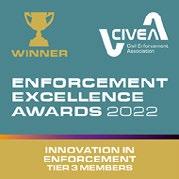
“We are so pleased with the revenue generated from a batch of cases that was due to be written off, we also wish to thank you for the sensitivity shown to the customers achieving these collections with zero complaints received” Royal Borough of Kensington & Chelsea Get your free no obligation Income Projection Report
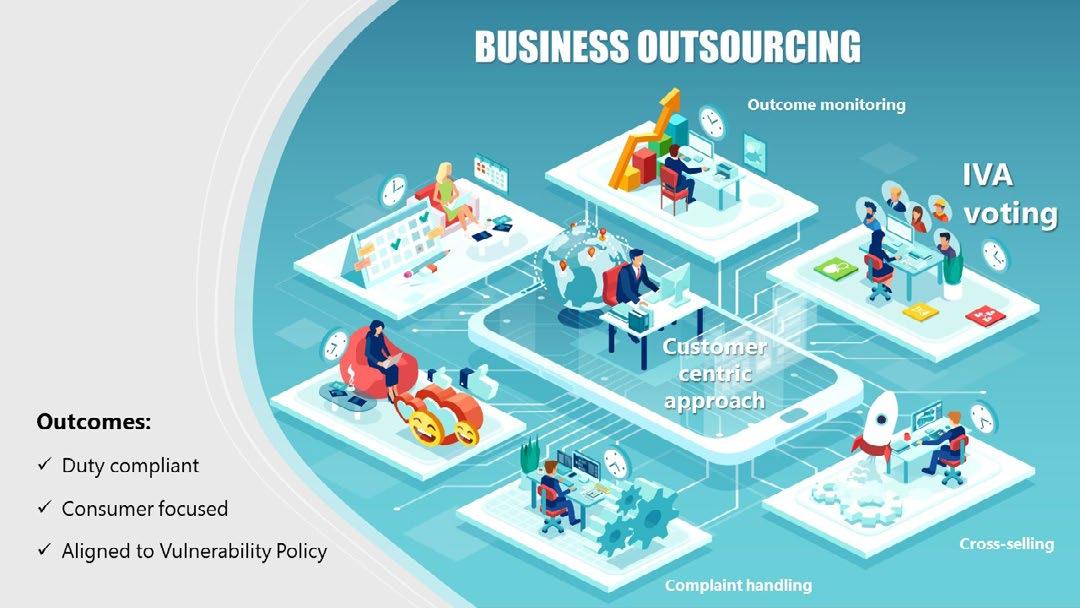
The Financial Conduct Authority (FCA) has been very active in the first half of 2024, with a number of new policy statements (e.g. PS24/2 – ‘Borrowers in Financial Difficulty’ ), “Dear CEO” communications (e.g. to consumer lenders, including Credit Unions on 20/3/2024) and data-driven surveys (e.g. Consumer support RFI, vulnerability survey in May 2024) that provide a clear direction of travel in the ‘debt sector’, including debt advisers and those involved in debt resolution in the widest sense across the supply chain (e.g. DCAs, enforcement agents, legal agents).
The arrears management handbook (CONC 7 1) changes have a deadline of November 2024, which include:
• Widening the spectrum of risk around vulnerability management
• More robust policies around affordability assessments & time-to-pay arrangements
• Use of tools like the Standard Financial Statement (SFS)
• Better engagement with the debt advice sector
• Encouraging data sharing, notably income & expenditure (‘tell me once’).
This was timed with communications from the FCA and the UK Regulators Network (UKRN 2) in March 2024 regarding the treatment of consumers with multiple debts, including those with essential service providers (e.g. Utilities) and central (e.g. DWP)/ local government debts (e.g. council tax). This remains closely aligned with the FCA Financial Lives survey data in a cost-of-living crisis, with the latest results from January 2024 3
For regulated firms, this has put significant emphasis on corporate governance, delivering better consumer outcomes and managing any conflicts of interest, where agent incentives and reward mechanisms are put under the microscope (e.g. ‘no win, no fee’ models).
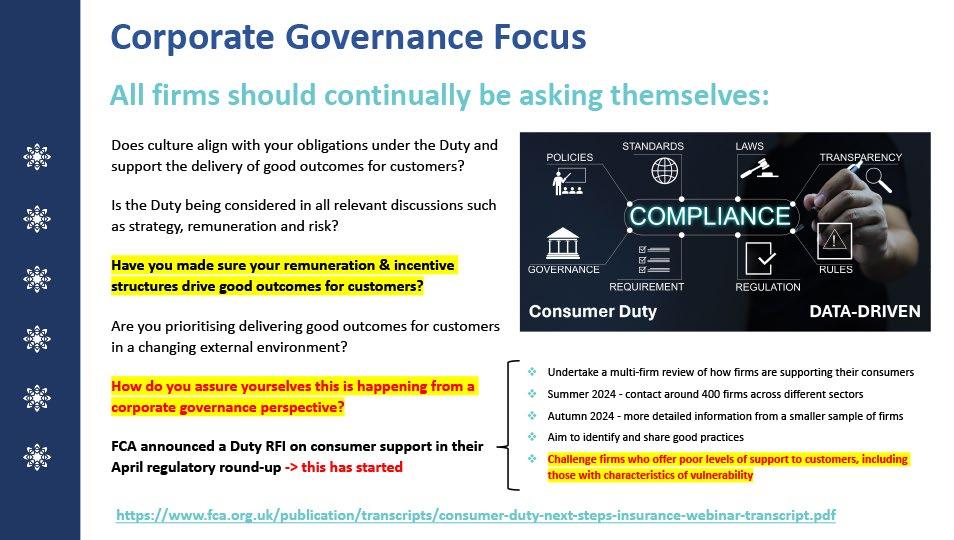
The debt advice sector is also subject to the same scrutiny. The debt packager referral fee ban was implemented in June 2023 (under PS23/5 4). Further collaboration is ongoing around marketing with new FCA ‘promoter’ permissions being implemented in February 2024.
The Insolvency Service has undertaken research into the mis-selling of IVAs (e.g. failures in the first two years) with the results expected to be published this summer. The government surprised many in the debt advice in the Spring Budget on 6th March 2024 with the changes to the DRO eligibility criteria.
Extract from the Spring Budget report:
3.41 To support households struggling with problem debts, the government is making it easier to access a Debt Relief Order (DRO). DROs are a personal insolvency debt solution for individuals who cannot pay their debts. At Spring Budget, the government is removing the £90 administration fee from 6th April 2024 . The government is also raising the maximum debt value threshold from £30,000 to £50,000 and increasing the maximum value of motor vehicle that an individual can retain from £2,000 to £4,000, from 28th June 2024 . These changes build on government’s record levels of funding for debt advice in England, meaning that more people can access debt relief and get a fresh start with their finances.
Many welcomed the removal of the £90 application fee from 6th April 2024, including DEMSA and debt solution providers (e.g. StepChange, PayPlan, Money Wellness).
The Insolvency Service 5 also welcomed the change.
The FCA also starts their review of the debt advice handbook (CONC 8) this summer along with the ongoing review of the vulnerability guidance (FG21/1). There will be considerable focus on the ‘sustainability’ of debt remedies in a volatile economy. The quality of debt advice remains a priority across community debt advice and national providers across all delivery mediums (e.g. face-to-face, by telephone and digitally).
‘The changing landscape for IVAs and Creditor Voting’
At recent creditor events in March and May entitled ‘The changing landscape for IVAs and Creditor Voting’ , I was involved in updating attendees on the recent FCA clarification that FCA-regulated creditors and debt buyers do need to consider their Consumer Duty obligations when voting on an IVA proposal under CONC 7.
We then explored the practical implications of this for regulated creditors and how they can ensure they remain compliant with minimal operational impact. We have extended these events to Credit Unions who were targeted in the recent FCA “Dear CEO” letters to consumer lenders. Credit Union voting behaviour is not dissimilar to that of local authorities.
1. https://www.fca.org.uk/publications/policy-statements/ ps24-2-strengthening-protections-borrowers-financialdifficulty
2. https://ukrn.org.uk/cost-of-living-working-group-jointletter-2/
3. https://www.fca.org.uk/publications/financial-lives/jan2024-recontact-survey-summary

Article copy (first line full out)....
Firms administering DMPs will need to think about portfolio assessments to review depreciating asset valuations (e.g. motor vehicles) to determine whether existing customers now qualify for a DRO individually, even in joint DMPs. My feeling is that the increase in debt level from £30,000 to £50,000 will have less of an impact.
For any creditors who may think that IVA voting is all “a little too far down the process” and that the FCA are unlikely to concern themselves with such a small part of the overall process, then the recent publication 6 by the FCA regarding how insurers valued stolen or written-off vehicles will make for uncomfortable reading.
This report demonstrates clearly that the FCA meant what is said when it told us that the Consumer Duty applied throughout the product Lifecyle and that they will not hesitate to investigate any aspects of the consumer journey where they think avoidable consumer harm is happening.
“To support their compliance with the Consumer Duty, firms should ensure they consider the needs of their customers at every stage of the product lifecycle.”
“We expect firms to consider the Consumer Duty when deciding to outsource activities and assess if outsourcing claims handling processes could have a negative impact for customers, taking mitigating steps if needed.”
Many creditors use voting agents to vote on their behalf in respect of IVA proposals. This can be sensible provided there is no conflict with their obligations under Consumer Duty in so doing, however it is important not to fall into the trap of assuming that because this process is outsourced that creditors do not need to concern themselves with how they are voting.
4. https://www.fca.org.uk/publications/policy-statements/ ps23-5-debt-packagers-feedback-cp23-5-final-rules
5. https://www.gov.uk/government/news/changes-to-debtrelief-orders-will-support-people-in-financial-distress
6. https://www.fca.org.uk/news/press-releases/fca-findsconcerns-over-insurers-valuation-written-or-stolen-vehicles
Under FCA rules, firms must take reasonable care to control their affairs effectively and responsibly, with adequate risk management systems (PRIN 3). Although firms can outsource activities, they cannot outsource accountability for ensuring these meet regulatory requirements, including requirements under the Consumer Duty. Indeed, accountability sits with senior managers (SMFs) within the firm appointing the Voting Agent. This will form part of their Statement of Responsibilities.
Under the Consumer Duty, the FCA expects firms to monitor and regularly review the outcomes that customers experience. If firms identify worse outcomes for any group of customers, they must take appropriate action to address this (under PRIN 2A).
So, as creditors and debt buyers prepare for the July 2024 deadline for Board reports to cover their compliance with Consumer Duty we posed the following questions in respect of the IVA proposals that firms have voted on:
• Can you evidence how you considered the outcome for the consumer when deciding how to vote?
• How are you monitoring the impact of how they voted and how are you ensure that how you vote in future delivers good outcomes for customers?
The creditor event recording and slides with the analysis of creditor voting behaviour can be found at the link below: https://more.ro-ar.com/CDSCreditorIVAScore202405/
 Kevin Still MCICM Director of DEMSA DEMSA
Kevin Still MCICM Director of DEMSA DEMSA
When looking at local authorities’ options for the recovery of sundry debt and other arrears, High Court enforcement under a writ of control is often the preferred option. However, High Court Enforcement Officers (HCEO) are currently not permitted to enforce debts below £600.
The High Court Enforcement Officers Association (HCEOA) has long been championing a change to the Jurisdiction Order 1991 to allow all judgments to be enforced by an HCEO, a change which would greatly benefit local authority revenue recovery.
The HCEOA has run several surveys of the industry, including local authorities, the legal profession, HCEOs and court users. Each time, the response has been a resounding “yes” , with 99% of respondents supporting change to the Jurisdiction Order to permit freedom of choice.
The HCEOA and its members believe that HCEOs could help court users by offering:
• Recovery through first-time compliance and early payment
• A flexible and sympathetic approach to enforcement
• Proven capacity to deliver a nationwide service
• Experienced and highly trained teams
• Full transparency and real time reporting
• The latest advances in technology
Currently, sub-£600 debts are enforced by County Court Bailiffs, many of whom have case backlogs. One HCEOA survey respondent commented:
“So many more cases would be put forward for enforcement if the law was to change, most of the time clients will not be interested in taking things further for lower debts due to the cost and lack of
success for County Court Bailiffs.”
A previous concern around making this change was to do with the fees to be charged for lower value judgments. The HCEOA has proposed that the fees that HCEOs charge for collecting debts under £600 should match the non-High Court fee scale for debts of the same amount.
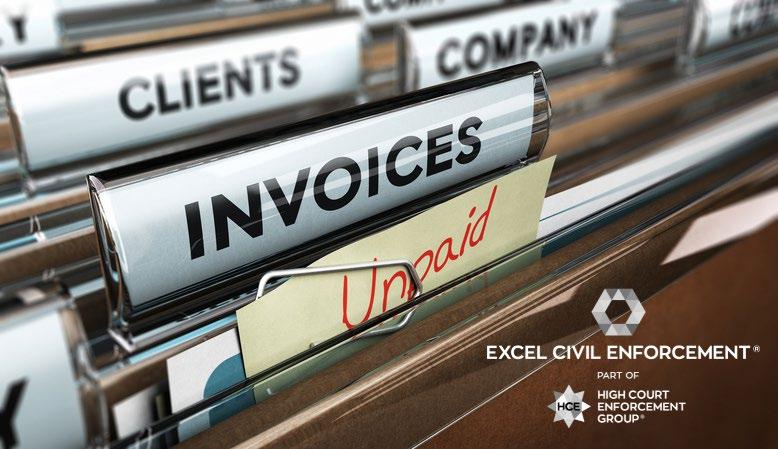
This would make the fees for judgments below £600 100% in line with the current system, which should align comfortably for local authorities.
In the second half of 2023, the Ministry of Justice published proposals for the long-awaited review of enforcement fees.
At Excel Civil Enforcement and High Court Enforcement Group, we think it likely that any change to the Jurisdiction Order would come after the enforcement fee review has been concluded, as a fee schedule for sub-£600 debts would be required.
As a group of companies, we continue to support the HCEOA in their campaign to secure freedom of choice for creditors.
 Laura Anne Smith Director of Client Relationships Excel Civil Enforcement
Laura Anne Smith Director of Client Relationships Excel Civil Enforcement
Penham Excel provides a professional enforcement service to both the Public and Private sector. We operate throughout England & Wales providing a range of debt and asset recovery services to local authorities (LAs), commercial property owners/management companies, solicitors, banks/finance organisations and housing associations, and all with market leading collections rates.
We are always looking to add value to the service we provide for LAs through understanding their issues and needs. As we explored the growing problem of Persistent Evaders of Penalty Charge Notices (PCNs), we liaised with the Police, DVLA and Government in order to tackle this issue, and discovered most evaders of PCNs had no vehicle tax.
The DVLA Devolved Powers have always been in place, however never really used by LAs in a proactive manner before, like deploying ANPR vehicles to track these vehicle owners down. They have only tended to use them in a reactive manner.
The DVLA actively want LAs to support them in tackling untaxed vehicles which are on the rise and welcome help by private enforcement companies like Penham Excel to work alongside them in order to do so. We also quickly saw the added benefits that LAs can gain from this process.
How we are helping LAs tackle Persistent Evaders
By working with LAs, the DVLA and Police we mix powers to enhance collection rates and clear the streets of illegal vehicles. Under DVLA Devolved Powers we can provide LAs with:
FREE Untaxed/No MOT/No Insurance Vehicle Removal
FREE PCN Persistent Evaders Enforcement
FREE Abandoned Vehicle Removal
FREE Fly Tipping Vehicle Removal
FREE Illegally Parked Vehicle Removal
FREE Travellers Vehicle Removal
FREE Nuisance Vehicle Removal
How can we do this free of charge for LAs?
Our work is pro-active, not reactive as we deploy ANPR vehicles in your area to identify illegal vehicles. We provide this free of charge as any collection of monies owed on Car Tax and unpaid PCNs includes a charge paid by the vehicle owner.
The Benefits of DVLA Devolved Powers
Dealing with Persistent Evaders of PCNs – Persistent evaders of road traffic debts are an increasingly common problem for LAs, however utilising industry leading initiatives and the very latest in ANPR technology we have successfully recovered thousands of pounds for LAs in England and Wales. The DVLA assists us with the correct registration of unregistered vehicles which we track down, so we can then attempt to recover unpaid parking fines for LAs.
Removing dangerous vehicles from your community – Our experience has shown us that many of the vehicles we have enforced against are unroad worthy and dangerous. Many show signs of not having a recent service or MOT.
Removing vehicles involved in criminal activities from your streets – Over 33.3% of vehicles we have enforced against over the last two years have been traced back to criminal activity. We have found a plethora of weapons including knives, baseball bats, tasers, guns and needles. We regularly find drug paraphernalia hidden in vehicles, and equipment that is used to produce, conceal, and consume illicit drugs.
Removal of abandoned vehicles from your community – Abandoned vehicles can cause a nuisance by obstructing roads, traffic and pedestrians. The sight of a damaged or slowly rusting car can also be an eyesore in the community, so we can respond quickly and remove them for you if they are untaxed and unmoved for over two months.
Reducing the number of cloned cars – Utilising the DVLA powers we are reducing the number of cloned cars on our roads and in turn disrupting criminal activities. This forms a natural enforcement process linked to the DVLA devolved powers and again is a free-of-charge service.
Offers excellent PR opportunities for the LA – The results of our service can provide excellent and regular PR opportunities to highlight how a LA is tackling the growing issue of dangerous and illegal vehicles on their streets, antisocial behaviour including criminal activities such as knife crime and drug dealing, as well as removing unsightly abandoned vehicles and illegal traveller encampments.
Reduces emissions through the removal of unfit vehicles –With some vehicles having not undergone an MOT, a very large percentage of vehicles removed are not fit for purpose and a real threat to the environment.
For more details on our DVLA service please contact us on: 033 000 20705






Follow us to see our latest official:
• press releases
• government news updates
• website blogs ...where we discuss industry topics and updates from the enforcement industry. Our regularly released blogs focus on key topics being discussed in the enforcement industry from updates from the Ministry of Justice to Government enforcement updates and regulations.
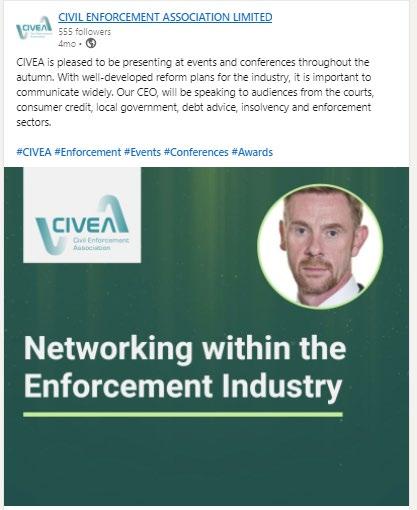
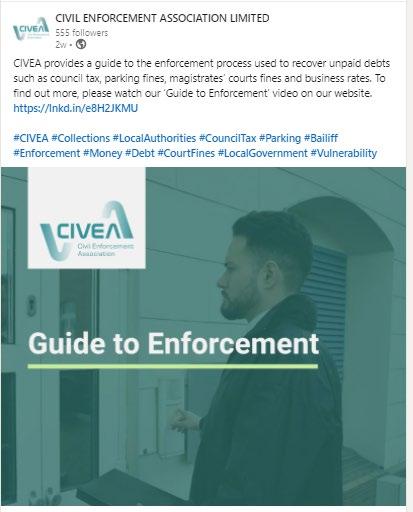

PO Box 745
WAKEFIELD WF1 9RJ
Email: admin@civea.co.uk
Telephone: 0844 893 3922